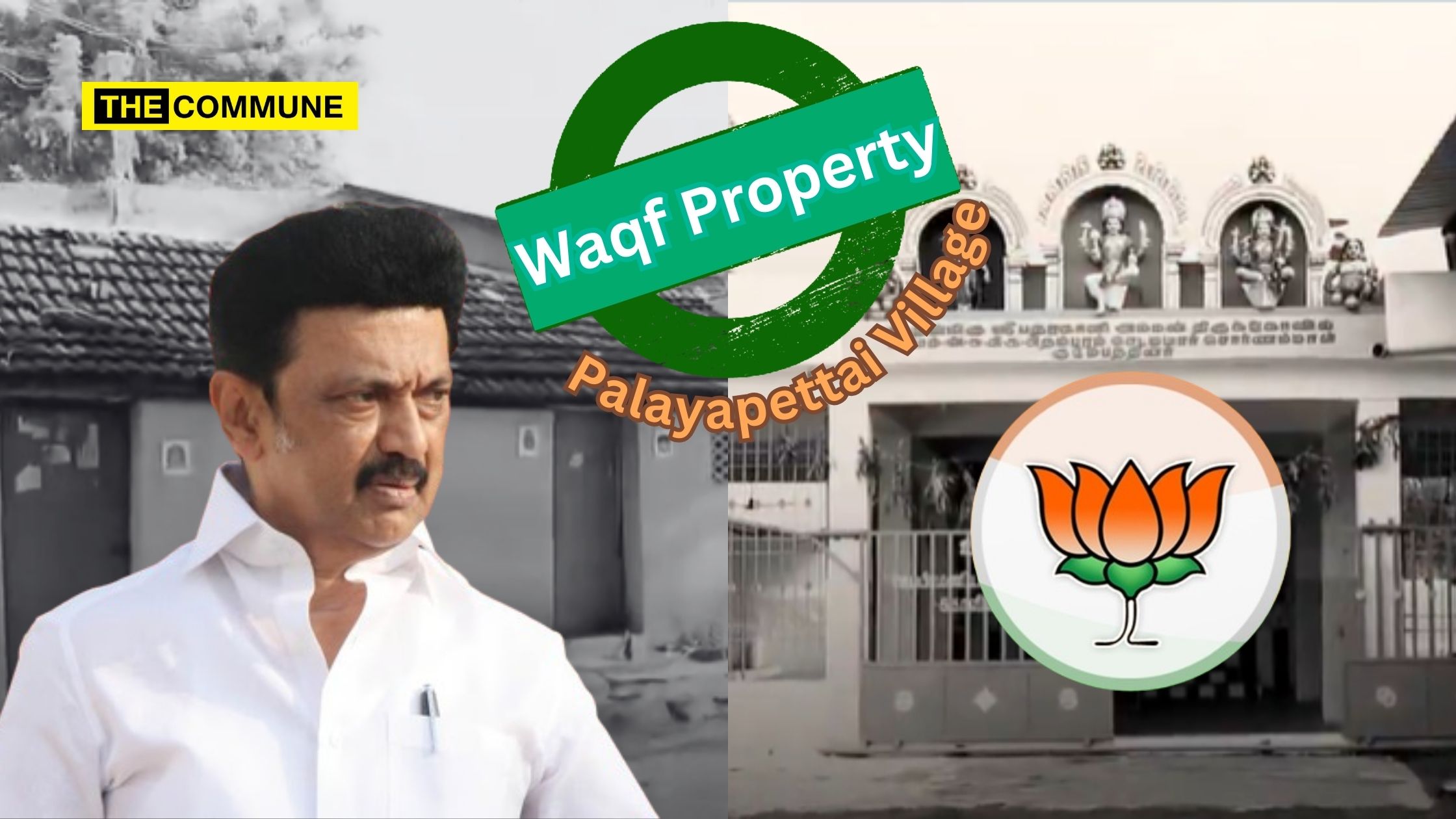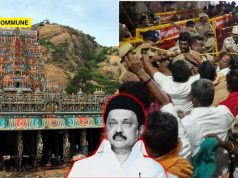
Amid Tamil Nadu Chief Minister MK Stalin’s resolution in the state legislative assembly on 27 March 2025, urging the Union government to withdraw the Waqf (Amendment) Bill, 2024, the Tamil Nadu BJP criticized the ruling DMK’s move. They released a video highlighting the impact of the Waqf Board Act on residents who have lost their livelihoods due to its biased and authoritarian nature, all under the watch of MK Stalin in the state.
The video shared by the Tamil Nadu BJP spotlighted the troubling situation in Palayapettai village in Tirunelveli district, which has around 1,500 homes. Of these, nearly 1,200 homes, some of which have been occupied for five to six generations, are now being claimed by the Waqf Board. Residents face constant harassment from Waqf authorities, who demand bribes for basic services such as setting up street lights, changing deeds from parents to children, or acquiring an NOC certificate. These bribes range from ₹50,000 to ₹1,00,000. Ironically, the Waqf Board, which came into existence in 1954, also claims ownership of a 500-year-old temple in the village.
In response, Tamil Nadu BJP posted on its official X account, stating, “It is high time that this Waqf Act, which continues to encroach upon the lands of indigenous peoples and make them refugees, without any formal documentation, should be amended.”
In the video shared by Tamil Nadu BJP, the party strongly declared, “Land is people’s recognition! Land is people’s identity! Land is people’s right! The Waqf Board seeks to seize the land that people have earned through generations of hard work, overcoming tears and hardships.”
One resident’s family in the video shared their painful experience, saying, “We have been living in the same village, in the same house, for over 150 years. Six generations of our family have lived in this house. I want to transfer the ownership of this house from my mother’s name to mine but when I tried to do, they said, ‘You cannot register it here.’ We asked the Sub-Registrar and he said, ‘Your ward has been blocked.’ When we asked who blocked it, they said, ‘The Waqf Board.’ They told us to go to the Waqf Board and obtain a No Objection Certificate (NOC). When we went to the Waqf Board office to request the NOC they demand ₹50,000 to ₹1,00,000 as a bribe. They keep saying, ‘None of the people in your area have any authority. You are all under the Waqf board’ and create issues by claiming we owe them money.”
Another resident said, “I have all the necessary documents, including the sale deed but they are refusing to proceed with the registration.”
A woman in the village shared her frustration, saying, “They claim that the land belongs to the Waqf Board and refuse to provide anything. The entire wall has cracks. When we approached the bank with the deed to request a loan they refused to provide it. What are we supposed to do?”
Another woman expressed her struggle, saying, “We are unable to build proper toilet facilities or install electric lights. When we request an electricity connection, they demand money. If we want to build a single room on our own land, they ask for separate payment for that too. So, what is the solution for us? We work hard to earn our living, while they exploit and extort money from us.” Another resident added, “They constantly come and harass us, demanding money.”
The 500-year-old temple in the village is also embroiled in disputes, as the Waqf Board claims ownership. This temple, where people have gathered to share their joys and sorrows, and the temple pond where they’ve immersed themselves in prayer, are cherished parts of the community’s life. These sacred places are now being claimed by the Waqf Board.
A villager shared, “This is the pathway to the temple and an arch was constructed here by the trustee but they came and protested saying it shouldn’t be built. We built only after obtaining permission from the police. If we try to do anything good for the temple, they say we shouldn’t. Hence, we are requesting the government authorities to resolve this issue once and for all.”
A female devotee and village resident questioned, “As Hindus, how can we not worship our deity?”
The fate of Palyapettai village in Tirunelveli district hangs in the balance, with houses on the brink of collapse, temple ponds choked with overgrown bushes, and a severe lack of basic amenities such as streetlights and proper roads. The lives of its residents remain uncertain.
எந்த வித முறையான ஆவணங்களும் இல்லாமல், மனம் போன போக்கில் பூர்வகுடி மக்களின் நிலங்களை ஆக்கிரமித்து அவர்களை அகதியாக்கும் சூழ்ச்சியாக நீடிக்கும் இந்த வக்ஃப் சட்டமானது, திருத்தப்பட வேண்டியது காலத்தின் கட்டாயம்.. pic.twitter.com/SqoAMiai65
— BJP Tamilnadu (@BJP4TamilNadu) March 27, 2025
Why is the Waqf (Amendment) Act necessary?
- In 2020, the Tamil Nadu Waqf Board claimed ownership of the entire Balasamudram Municipality in Dindigul district, asserting that their records indicate the area spans 389 acres. Due to ongoing legal disputes, this claim has left approximately 10,000 residents in limbo, as they can now not sell their ancestral properties.
- In September 2022, the Tamil Nadu Waqf Board claimed ownership of the entire Thiruchendurai village in Tiruchirapalli, including temple lands, sparking significant concern among residents. This claim emerged when local farmer Rajagopal was required to obtain a No Objection Certificate from the Waqf Board to register his land sale, despite having proper revenue documents. The claim was recently debated in parliament, including over the 1,500-year-old Manendiyavalli Sametha Chandrasekhara Swamy temple. The Tamil Nadu Registration Department has acknowledged issues with encroachments and disputed properties but struggled to justify the Waqf Board’s claims over temple lands.
- In 2023, the Tamil Nadu Waqf Board asserted ownership over land allocated to 73 Scheduled Caste families in Anganakaundan Puthur, Erode District. The Tamil Nadu government provided this land in 1980 after a flood, and since then, it has been their home for 40 years. The Waqf Board’s claim has caused significant challenges, including transferring land titles, registering deeds, and obtaining loans.
- In January 2023, the DMK government wrongly reclassified 57 acres of agricultural land in Veppur village, Ranipet District, as Waqf Board property. This land, which Hindu families had farmed for decades, was abruptly claimed by the Waqf Board without proper notice or due process, causing considerable distress among the affected farmers.
- On 11 August 2024, former Tamil Nadu Waqf Board President Abdul Rahman claimed that the Peyazhwar Temple in Mylapore, Chennai, which is allegedly situated on land claimed by the Kutchery Road Mosque.
- In January 2025, residents of Min Nagar in Kanchipuram district faced challenges after the Tamil Nadu Waqf Board claimed 2.43 acres of land they’ve lived on for over 40 years. The Kanchipuram Registrar’s Office confirmed the claim, hindering property registrations. The land was purchased in 1982 by employees of the Kanchipuram Electric City Office.
Subscribe to our channels on Telegram, WhatsApp, and Instagram and get the best stories of the day delivered to you personally.




